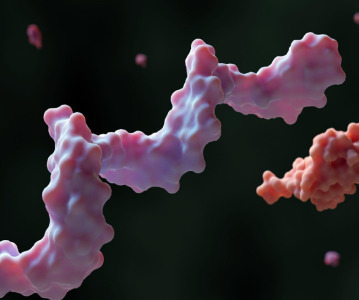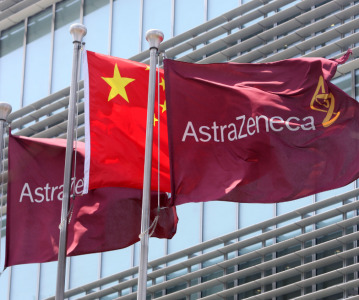NIH-Funded Scientists Create Potential Long-Acting HIV Therapeutic

Scientists have created a new molecule that shows promise for controlling HIV without daily antiretroviral drugs. The molecule foils a wider range of HIV strains in the laboratory than any known broadly neutralizing HIV antibody and is more powerful than some of the most potent of these antibodies. In addition, the molecule safely protected monkeys from infection with an HIV-like virus during a 40-week study period. Together, the data suggest that the molecule could, with further research, be used to subdue HIV in humans. The authors note that the molecule potentially could be used as both a preventative drug and as a treatment. The new findings appear in the 18 February issue of the journal Nature.
“This innovative research holds promise for moving us toward two important goals: achieving long-term protection from HIV infection, and putting HIV into sustained remission in chronically infected people,” said Anthony S. Fauci, director of the National Institute of Allergy and Infectious Diseases (NIAID), part of the National Institutes of Health.
The research was led by Michael Farzan, a professor in the department of infectious diseases at The Scripps Research Institute in Jupiter, Florida. The work was funded primarily by NIAID.
The new molecule is called eCD4-Ig and works by tightly binding to two unchanging sites on the surface of HIV that the virus uses to attach to receptors on cells called CD4 and CCR5. Typically, when HIV attaches to these receptors, it unlocks a door to the cell and gets inside. However, when eCD4-Ig binds to HIV, it effectively takes away the virus’s key, locking it out of the cell and preventing it from multiplying.
“Our molecule appears to be the most potent and broadest inhibitor of HIV entry so far described in a preclinical study,” said Dr Farzan. “If one could inject either eCD4-Ig or our gene therapy tool into people with HIV infection, it might control HIV for extended periods in the absence of antiretroviral drugs. Further research will help illuminate the promise of these approaches.”
To build on their findings, the scientists are studying both the therapeutic potential of eCD4-Ig in monkeys infected with HIV-like viruses and the ability of eCD4-Ig to prevent infection against a wider range of HIV and HIV-like strains.
NIAID has funded the newly published and ongoing research through an initiative called Beyond HAART: Innovative Therapies to Control HIV-1, which supports the development of strategies for suppressing HIV in the absence of antiretroviral drugs.
Related News
-
News Google-backed start-up raises US$600 million to support AI drug discovery and design
London-based Isomorphic Labs, an AI-driven drug design and development start-up backed by Google’s AI research lab DeepMind, has raised US$600 million in its first external funding round by Thrive Capital. The funding will provide further power t... -
News AstraZeneca to invest US$2.5 billion in Beijing R&D centre
Amid investigations of former AstraZeneca China head Leon Wang in 2024, AstraZeneca have outlined plans to establish its sixth global strategic R&D centre in China. Their aim is to further advance life sciences in China with major research and manufact... -
News Experimental drug for managing aortic valve stenosis shows promise
The new small molecule drug ataciguat is garnering attention for its potential to manage aortic valve stenosis, which may prevent the need for surgery and significantly improve patient experience. -
News How GLP-1 agonists are reshaping drug delivery innovations
GLP-1 agonist drug products like Ozempic, Wegovy, and Mounjaro have taken the healthcare industry by storm in recent years. Originally conceived as treatment for Type 2 diabetes, the weight-loss effects of these products have taken on unprecedented int... -
News A Day in the Life of a Start-Up Founder and CEO
At CPHI we work to support Start-Up companies in the pharmaceutical industry and recognise the expertise and innovative angles they bring to the field. Through our Start-Up Programme we have gotten to know some of these leaders, and in this Day in the ... -
News Biopharmaceutical manufacturing boost part of new UK government budget
In their national budget announced by the UK Labour Party, biopharmaceutical production and manufacturing are set to receive a significant boost in capital grants through the Life Sciences Innovative Manufacturing Fund (LSIMF). -
News CPHI Podcast Series: The power of proteins in antibody drug development
In the latest episode of the CPHI Podcast Series, Lucy Chard is joined by Thomas Cornell from Abzena to discuss protein engineering for drug design and development. -
News Amgen sues Samsung biologics unit over biosimilar for bone disease
Samsung Bioepis, the biologics unit of Samsung, has been issued a lawsuit brought forth by Amgen over proposed biosimilars of Amgen’s bone drugs Prolia and Xgeva.
Position your company at the heart of the global Pharma industry with a CPHI Online membership
-
Your products and solutions visible to thousands of visitors within the largest Pharma marketplace
-
Generate high-quality, engaged leads for your business, all year round
-
Promote your business as the industry’s thought-leader by hosting your reports, brochures and videos within your profile
-
Your company’s profile boosted at all participating CPHI events
-
An easy-to-use platform with a detailed dashboard showing your leads and performance







.png)